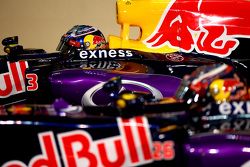Horner: More to Red Bull engine saga than "meets the eye"
Red Bull boss Christian Horner suggests there is more to the story as to why his team failed to get a new engine deal for 2016 than people widely believe.

Photo by: XPB Images













The Milton Keynes-based team chased customer deals with Mercedes, Ferrari and Honda for next season, but each of them rejected its overtures.
In the end, Red Bull was forced to stick with Renault – and will run the power units rebadged with the TAG Heuer name in 2016.
When asked by Motorsport.com if he was shocked about how hard it proved to be for Red Bull to secure an engine, Horner said: “I think there is an awful lot more to it than meets the eye.
“In the summer there were a lot of discussions. There were agreements between individuals that were later reneged upon, and an awful lot of politics put in to play.
“If you are a competitive team, then there is an obvious conflict within that team if you are a supplier [of engines] as well. The engines are the biggest performance differentiator in F1 at the moment: forget drivers and chassis to a degree.
“So you can understand why Mercedes and Ferrari wouldn't be particularly keen to give their biggest asset to a competitive rival team. They tried very hard at a team level to achieve that.
“But this is where I think perhaps the rules needs looking at. It cannot be right that a group of manufacturers can get together and say, 'we are happy to see Red Bull go to the wall.'”
Wolff influence
Horner says that Red Bull owner Dietrich Mateschitz believed that a deal with Mercedes was in play over the summer, following an informal handshake he had with Niki Lauda.
However, the plans came to nothing – with Mercedes motorsport boss Toto Wolff known to be reluctant to proceed with a Red Bull deal.
“He [Mateschitz] was involved in the negotiations at the forefront of this, and believed he had a deal,” said Horner.
“Dietrich has always worked on handshake qualities, and that is the way he has run his business and run his life.
“I have been around long enough to not be totally surprised. It is a competitive business at the end of the day.
“Niki Lauda tried his hardest to make it happen and unfortunately Toto was particularly unkeen to see Mercedes power in the back of a Red Bull car.”
Rivals fears
Horner believes Red Bull's hopes of getting engines were also hampered by the competitiveness of its chassis – which left rivals worried about what the team could achieve in 2016.
“Our performance at Spa in the middle sector seemed to spook a few people, around the time we were discussing with Mercedes,” he said. “And our performance in Singapore seemed to totally spook Ferrari.
“So yes, in some ways you are a victim of your own success. But you have to keep fighting and solutions will present themselves.”
Rules problem
Horner thinks ultimately Red Bull's struggles to land an engine were symptomatic of an overall problem in F1 relating to power unit regulations and distribution.
“It is part of a bigger issue in Formula 1 – that firstly the power units that we were offered but were not available, some of them were in excess of 30 million Euros.
“Secondly they weren't available and thirdly you have this massive disparity between the best and the worst. And that doesn't make the racing any closer.
“So the FIA and the commercial rights holder need to grab a hold of it and come up with a more affordable, available, less-technical engine.”
Be part of Motorsport community
Join the conversationShare Or Save This Story
Subscribe and access Motorsport.com with your ad-blocker.
From Formula 1 to MotoGP we report straight from the paddock because we love our sport, just like you. In order to keep delivering our expert journalism, our website uses advertising. Still, we want to give you the opportunity to enjoy an ad-free and tracker-free website and to continue using your adblocker.


















Top Comments